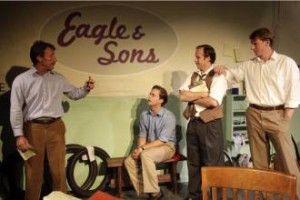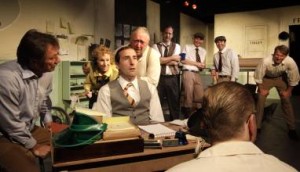
“Attention must be paid to such a person,” declares Linda Loman at the end of Arthur Miller’s 1949 masterpiece Death Of A Salesman, eulogizing a husband who woke up one morning to find that the thirty-four years he’d spent as a traveling salesman had been for naught.
Six years later, Miller paid attention to similar lives of fruitless drudgery in A Memory Of Two Mondays, now being given a rare revival at Santa Monica’s Ruskin Group Theatre. Just as their intimate staging of Miller’s All My Sons last year demonstrated the Ruskin’s expertise at bringing the Pulitzer Prize winning playwright to 21st Century life, so does the sure hand of director Amelia Mulkey make this return to Miller territory an unforgettable one.
A Memory Of Two Mondays’ protagonist is a wide-eyed eighteen-year-old Miller stand-in named Bert (Lane Compton), a young man who, just as the playwright himself did in the early 1930s, has taken a job to set aside money for college. A young man with big dreams, Bert toils in the shipping room of a large auto-parts warehouse at the height of the Great Depression, a period during which he and his coworkers were among the 75% of Americans lucky enough to have a job, no matter how exhausting, boring, and unpleasant it might be.
As its title suggests, A Memory Of Two Mondays takes place on a pair of Mondays, the first the stiflingly hot summer day Adolph Hitler took power in Germany (though only Bert is world-aware enough to know this), the second the bleak winter morning that Bert, about to start his college studies, bids adieu to the friends he has made there. Never without a copy of the day’s New York Times or Tolstoy’s War And Peace, Burt subsists on four dollars a week of his fifteen dollar weekly salary (still only $250 in today’s currency), saving the rest for the higher education he knows is his way up in the world.
There is no way up or out for other men and women working beside him day-in day-out for little or no reward, not for Larry (Jason Paul Field) or for Tom (Conor Walshe) or for Raymond (Gregory G. Giles) or for Gus (Richard Leighton). Newcomer Kenneth (Nick Cimiluca) may still have an Irishman’s stars in his eyes, singing folk songs and quoting from Walt Whitman, but not for long, his spirit too about to be crushed by daily drudgery and a newfound love of “the drinkin’.”
Over the course of the titular Mondays (and a seventy-five minute running time), Miller offers us a slice of these workers’ lives, and though not much “happens” plot-wise to the majority of them, the effect of spending time as flies on a warehouse wall leaves the audience impacted and moved by the experience.
Larry has bought a car he can’t afford because he’s “approaching forty” and “What am I going to be careful for?”, though this means that should one of his kids gets sick, “I’ll be strapped.” Tom arrives at work so drunk he is literally catatonic, and although a scene in which his coworkers conspire to make it look like he’s busy at his desk could fit right into a 1950s sitcom, it is no less heartbreaking for making us laugh. Raymond may have the title “foreman,” but that doesn’t mean his life is any more fulfilling than the others’. As for Gus, the Eastern European immigrant’s good-humored wisecracks may well camouflage the burnout of a man who has slaved for twenty-two years, and for what?
A Memory Of Two Mondays’ large cast of characters is completed by spinster receptionist Agnes (Lynn Wanlass), pretty secretary Patricia (Julia McIlvaine), 70something Jim (Paul Denk), shipping clerk Frank (Jeison Azali), drinking buddies Jerry (Timothy George Connolly) and Willy (Val Masouris), a mechanic (Hamilton Matthews), and warehouse owner Mr. Eagle (Billy Ensley).
Though Arthur Miller is working on a smaller scale than usual this time around, the impact of this mere hour and fifteen minutes of Miller is a powerful one. However brief our glimpses into these lives of quiet desperation might be, each character leaves his or her impression. Our hearts ache for those who remain trapped, and particularly for those whose decline we observe over the space of only a few months, and yet we rejoice in knowing that Miller’s surrogate, like the playwright, may well be making his escape to greatness.
An abrupt midstream shift into memory play territory, one which has Bert suddenly breaking the fourth wall, is about the only awkwardness in an otherwise impeccably written and constructed script, and at the Ruskin there is truly not a weak link in the cast of fourteen, making it one of the finest dramatic ensembles you’re likely to see all year, Field, Giles, recent USC grad McIlvaine, and Wanlass making particularly strong impressions.
Still, a quartet of performances stand out highest among the crowd.
Compton is absolute perfection as Bert, investing the character with such All-American goodness, heart, and charm as to win over even the hardest-hearted audience member. Cimiluca, one of L.A.’s most dynamic young actors, continues a string of terrific performances with a rich and heartbreaking turn as a man whose optimistic flame burns out right before our eyes. Walshe, whose Irish brogue is the one he grew up with, takes a character whose boozy stupor might end up cartoonish in lesser hands, and makes it painfully real, as is his later transformation into honest-to-goodness functioning human being. Finally, there is the towering work of Leighton, a seasoned actor who so disappears into Gus’s worn-out, worn-down (yet still feisty skin) that it seems less a performance than a simple yet highly complex act of being.
Mike Reilly’s lighting design does more than just illuminate Cliff Wagner’s impressively detailed set, it ups the dramatic impact scene after scene. (That the Ruskin Theatre was once a Santa Monica Airport hangar makes Wagner’s set even more believable.) Kudos go too to Lola Kelly’s period costumes, Christopher Richard’s original score and Karen Landry’s scenic painting. An anachronistic coiled phone cord and Patricia’s too short skirts are minor design flaws. Nicole Millar is stage manager and McIlvaine assistant director. A Memory Of Two Mondays is produced by Mikey Myers and Reilly.
No production of A Memory Of Two Mondays, no matter how great, will ever earn it a spot on a list of Arthur Miller’s Greatest Hits. Those will will remain Death Of A Salesman, All My Sons, The Crucible, and A View From The Bridge. Still, this largely forgotten gem is no less a treat for being minor Miller. Like other fans of the greatest American playwright of the 20th Century, I’ll take minor Arthur Miller over major Anyone Else any day.
Ruskin Group Theatre, 3000 Airport Avenue, Santa Monica.
www.ruskingrouptheatre.com
–Steven Stanley
June 12, 2011
Photos: Agnes Magyari




 Since 2007, Steven Stanley's StageSceneLA.com has spotlighted the best in Southern California theater via reviews, interviews, and its annual StageSceneLA Scenies.
Since 2007, Steven Stanley's StageSceneLA.com has spotlighted the best in Southern California theater via reviews, interviews, and its annual StageSceneLA Scenies.







 COPYRIGHT 2024 STEVEN STANLEY :: DESIGN BY
COPYRIGHT 2024 STEVEN STANLEY :: DESIGN BY